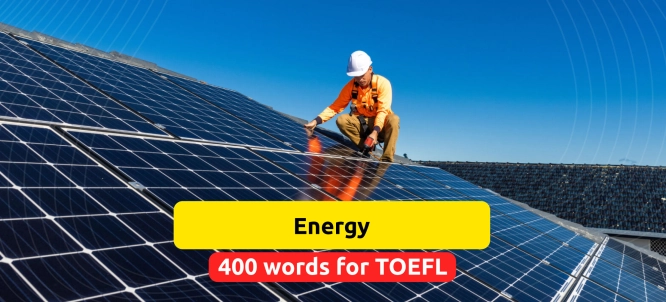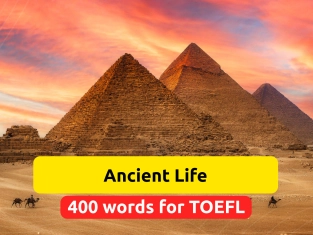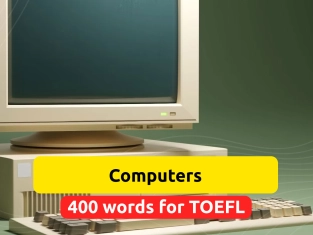by PushtoLearn
Energy
Table of Contents
Energy Flashcards - Vocabulary Practice for TOEFL
These exercises focus on Energy Vocabulary
List of Energy Words for the TOEFL
|
Word |
Definition |
Example |
|
Combustion |
The process of burning something to produce energy. |
Fossil fuels undergo combustion to release energy. |
|
Component |
A part or element of a larger system. |
Each component of the engine plays a vital role in its function. |
|
Convey |
To transport or communicate something. |
Pipes convey natural gas to homes for heating. |
|
Discretely |
Separately or distinctly. |
The system works by treating each unit discretely before combining them. |
|
Nucleus |
The central or most important part of something, often an atom. |
The nucleus of an atom contains protons and neutrons. |
|
Permeate |
To spread or pass through something. |
Solar energy permeates the atmosphere, providing light and warmth. |
|
Rotate |
To spin or turn around a central point. |
The blades of the wind turbine rotate to generate electricity. |
|
Solar |
Relating to or derived from the sun. |
Solar panels convert sunlight into usable energy. |
|
Source |
The origin or starting point of something. |
The primary source of energy for life on Earth is the sun. |
|
Trigger |
To cause something to happen. |
Heat can trigger a chemical reaction in certain materials. |

Usage in TOEFL Exam Formats
Reading Section
-
Words like combustion, solar, and nucleus appear frequently in passages about energy and science.
-
Example Question: What does the author imply about the nucleus in energy production?
Listening Section
-
Terms like convey, rotate, and trigger may be used in lectures about mechanical or energy systems.
-
Example: “When the turbine rotates, it generates electrical energy.”
Writing Section
-
Use advanced words like permeate, discretely, and component to showcase your vocabulary.
-
Example Sentence: “Each component of the solar panel works discretely to ensure maximum efficiency.”
Speaking Section
-
Employ descriptive terms like source, solar, or combustion to articulate points clearly.
-
Example: “Solar energy is a sustainable source that doesn’t rely on combustion.”
Common Mistakes
-
Misusing "Convey" in Abstract Contexts:
-
Mistake: "The solar energy conveys power to the Earth."
-
Correction: "The solar panels convey electricity to homes."
-
Confusing "Discretely" with "Discreetly":
-
Mistake: "The turbine functions discreetly to avoid detection."
-
Correction: "The turbine functions discretely, with each blade operating independently."
-
Overgeneralizing "Permeate":
-
Mistake: "The energy permeates quickly to power the city."
-
Correction: "The sunlight permeates the atmosphere, warming the Earth."
-
Using "Trigger" in Incorrect Contexts:
-
Mistake: "The button triggered the electricity to happen."
-
Correction: "The heat triggered the combustion process."
-
Confusing "Rotate" with "Revolve":
-
Mistake: "The Earth rotates around the sun."
-
Correction: "The Earth revolves around the sun, while it rotates on its axis."
FAQ
What does "combustion" mean in energy-related contexts?
"Combustion" refers to the process of burning fuel to release energy, such as in engines or power plants.
How is "discretely" used in scientific explanations?
"Discretely" means treating or considering things as separate units, like analyzing components of a system individually.
What’s the difference between "convey" and "transport"?
"Convey" implies communication or transmission, while "transport" specifically refers to physical movement.
Why is "solar" important in TOEFL essays?
"Solar" is often used to discuss renewable energy and sustainability, showcasing your ability to address global issues.
How can I use "trigger" in TOEFL responses?
Use "trigger" to describe cause-and-effect relationships, e.g., “The heat triggered the reaction, leading to energy release.”

